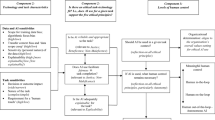Abstract
Inadequate clinical knowledge has a profound effect on the organization and administration of a state mental hospital. The official goal of active treatment is displaced by the operative goal of custody and there is a reliance upon hierarchy rather than expertise as the source of authority.
Similar content being viewed by others

References
Belknap, Ivan.Human Problems of a State Mental Hospital. New York: McGraw Hill, 1956.
Biddle, Bruce J. Roles, goals, and value structures in organizations. In: Cooper, W.W., ed.New Perspectives in Organizational Research. New York: John Wiley, 1964.
Blakeslee, Sandra. Eight Feign Insanity in Test and are Termed Insane. Special to the New York Times, January 20, 1973, 23.
Bloom, Bernard.Community Mental Health: An Historical and Critical Analysis. New Jersey: General Learning Press, 1973.
Braginsky, B., Braginsky, D., and Ring K.Methods of Madness: The Mental Hospital as a Last Resort. New York: Holt, Rinehart and Winston, 1969.
Buxbaum, Carl B. Second thoughts about community mental health.Social Work, 5(3):29–45, 1973.
Coser, Rose L. Authority and decision-making in a hospital.American Sociological Review, 23(1):56–63, 1958.
Cressey, Donald R. Achievement of an unstated organizational goal.Pacific Sociological Review, 1(2):43–49, 1958.
Deutsch, Albert.The Mentally Ill in America. New York: Columbia, 1949.
Dunham, Warren H. and Weinberg, Karen S.The Culture of the State Mental Hospital. Detroit: Wayne State University Press, 1960.
Etzioni, Amitai.A Comparative Analysis of Complex Organization. New York: Free Press, 1961.
Greenblatt, Milton, and Glazier, Elizabeth. The phasing out of mental hospitals in the United States.American Journal of Psychiatry. 132(11):1135–1139, 1975.
Goffman, Erving.Asylums. New York: Doubleday, 1961.
Katz, Daniel and Kahn, Robert L.The Social Psychology of Organizations. New York: John Wiley, 1966.
Merton, Robert K. Bureaucratic structure and personality. In: Merton, R.K.,Social Theory and Social Structure. New York: Free Press, 1957.
Mirelowitz, Seymour. Alienation and bureaucraticization of mental health organizations.Mental Hygiene. 56(2):3–12, 1972.
Musto, David. Whatever happened to community mental health?Public Interest. 39(2):53–58, 1975.
Perrow, Charles. Hospitals: technology, structure and goals. In: March, J.G., ed.Handbook of Organizations. Chicago: Rand McNally, 1965.
Perrow, Charles. The analysis of goals in complex organizations.American Sociological Review, 26(6):854–866, 1961.
Perrow, Charles. A framework for the comparative analysis of organizations.American Sociological Review, 32(2): 194–208, 1967.
Reidel, Donald, Tishler, Gary L., and Myers, Jerome.Patient Evalution in Mental Health Programs. Cambridge: Ballinger, 1974.
Rogers, Kenn. State mental hospitals: an organizational analysis.Administration in Mental Health, 3(1): 12–21, 1975.
Rosengren, William B. Communication, organization and conduct in the therapeutic milieu.Administrative Science Quarterly, 9(1): 70–90, 1964.
Rothman, Jack.Planning and Organizing for Social Change. New York: Columbia University Press, 1974.
Sarbin, Melvin. The concept of hallucination.Journal of Personality, 35(3):359–380, 1967.
Sarbin, Melvin. Toward a more rigorous definition of mental health. In: Roberts, Leigh M.Comprehensive Mental Health. Wisconsin: University of Wisconsin Press, 1968.
Schapire, Hans. The state hospital: what is its future?Mental Hygiene, 58(2): 11–16, 1974.
Scheff, Thomas.Being Mentally Ill: A Sociological Theory. Chicago: Aldine, 1966.
Scheff, Thomas. Control over policy by attendants in a mental hospital.Journal of Health and Human Behavior, 2(2):93–105, 1961.
Simon, Herbert A. On the concept of organizational goal.Administrative Science Quarterly, 9(1):1–22, 1964.
Stanton, Alfred J., and Schwartz, Morris S.The Mental Hospital. New York: Basic Books Inc., 1954.
Thompson, James D.Organizations in Action. New York: McGraw-Hill, 1967.
Thompson, James D., and Bates, Frederick L. Technology, organization, and administration.Administrative Science Quarterly, 2(3):325–342, 1957.
Weber, Max.From Max Weber: Essays in Sociology. Trans. and ed. by H.H. Gerth and C.W. Mills. New York: Oxford University Press, 1967.
Weiss, Carol.Evaluating Action Programs: Readings in Social Action and Education. Boston: Allyn and Bacon, 1972.
Author information
Authors and Affiliations
Rights and permissions
About this article
Cite this article
Miringoff, M.L. Incomplete technology and the organizational dynamics of a state mental hospital. Administration in Mental Health 3, 133–145 (1976). https://doi.org/10.1007/BF02619674
Issue Date:
DOI: https://doi.org/10.1007/BF02619674



